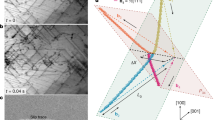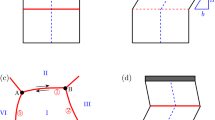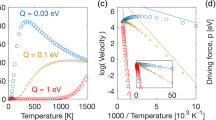Abstract
SEVERAL workers have shown that when polycrystalline metals are made to creep, that is, to deform at an elevated temperature, the grain boundaries move in a direction more or less perpendicular to themselves, just as when grain growth occurs1. This is migration of the boundaries, as distinct from the sliding movement, which also occurs during creep, of one grain past another. Some recent measurements show that the amount of movement is a function of the applied stress. An explanation of this is put forward here which involves an interaction between crystal slip and movement at boundaries.
This is a preview of subscription content, access via your institution
Access options
Subscribe to this journal
Receive 51 print issues and online access
$199.00 per year
only $3.90 per issue
Buy this article
- Purchase on Springer Link
- Instant access to full article PDF
Prices may be subject to local taxes which are calculated during checkout
Similar content being viewed by others
References
Wyon, G., and Crussard, C., Rev. Mét., 48, 121 (1951). Chang, H. C., and Grant, N. J., J. Metals, 4, (6) (1952).
Shockley, W., and Read, W. T., Phys. Rev., 75, 692 (1949).
Mott, N. F., Proc. Phys. Soc., 60, 391 (1948).
Author information
Authors and Affiliations
Rights and permissions
About this article
Cite this article
McLEAN, D. Interaction between Crystal Slip and Grain Boundary Movement. Nature 172, 300–301 (1953). https://doi.org/10.1038/172300a0
Issue Date:
DOI: https://doi.org/10.1038/172300a0
This article is cited by
-
Dynamic Abnormal Grain Growth in Molybdenum
Metallurgical and Materials Transactions A (2013)
-
Grain boundary deformation in fine-grained electrolytic magnesium
JOM (1957)
Comments
By submitting a comment you agree to abide by our Terms and Community Guidelines. If you find something abusive or that does not comply with our terms or guidelines please flag it as inappropriate.



